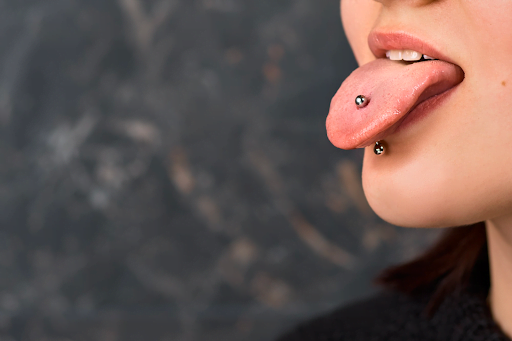Mouth piercings are all the rage with body modifications but before you take the plunge, you’re going to want to know everything about the potential risks and consequences that come with them, so you can make an informed decision. At Affinity Dentistry, we are here to guide you through the impact of mouth piercings on your oral health and offer our knowledgeable advice on maintaining a healthy smile with confidence so you can decide on your self-expression with confidence. Let’s explore the facts together.
What are Mouth Piercings?
To understand the impact of mouth piercings on your oral health, it’s important to know what they are and the various types available. Mouth piercings involve the insertion of jewellery into different parts of the mouth, such as the lips, tongue, or cheeks.
There are several types of mouth piercings, each with its own unique placement and style.
Some popular mouth piercings include:
- Lip piercing: This involves piercing the upper or lower lip, usually in the centre or off to one side.
- Tongue piercing: A hole is made through the centre of the tongue, allowing for the placement of jewellery.
- Labret piercing: Located just below the lower lip, this piercing involves a small stud or ring.
- Cheek piercing: Also known as dimple piercings, these are placed on the cheeks, creating a dimple-like effect.
Risks Associated with Mouth Piercings
You may not know, but mouth piercings are semi-permanent and if not taken care of properly, they may cause the following complications and problems:
Gum Disease
The jewellery in mouth piercings, such as lip or tongue studs, can cause potential injury to your gums. These injuries can lead to gum inflammation, infection, and even gum disease in extreme cases and if not taken care of straight away. The constant friction caused by the rubbing of the jewellery against the gums can result in recession, making the teeth more susceptible to decay and sensitivity.
Damage to Teeth
When it comes to mouth piercings, your teeth can bear the brunt of it as they are at risk of chipping or cracking if they come into harsh contact with the metal. Accidental bites on the jewellery can cause trauma to the teeth, which can then in turn lead to long-term damage. Additionally, tongue piercings can cause wear on the enamel of the teeth due to the constant contact and friction they have.
Oral Infections
Mouth piercings can also create openings in the oral cavity, providing an entry point for bacteria. Poor oral hygiene or improper aftercare can increase the risk of infection. In severe cases, infections can spread and become systemic, affecting other parts of the body.
Nerve Damage
Tongue piercings, in particular, carry the risk of nerve damage. Puncturing the tongue incorrectly or hitting a nerve during the piercing process can result in altered sensation, numbness, or even loss of taste.
Swelling and Prolonged Healing
After getting a mouth piercing, swelling and tenderness are common during the initial healing period. However, in some cases, swelling can be excessive and prolonged, which can lead to difficulty speaking, eating, or carrying out daily activities.
Allergic Reactions
Some individuals may have an allergic reaction to the metals used in mouth piercings, such as nickel. Allergic reactions can cause inflammation, redness, itching, and other uncomfortable symptoms in the mouth.
While these risks may sound alarming, it’s essential to remember that everyone’s experience with mouth piercings can differ. If you decide to get a mouth piercing, make sure to choose a reputable piercer, maintain proper oral hygiene, and promptly address any signs of complications or concerns that arise!

Oral Hygiene Tips for Mouth Piercing
When it comes to maintaining good oral health with a mouth piercing, proper oral hygiene is essential. Following these practical tips will help to prevent infections and complications to your oral health!
- Clean your piercing regularly: Use a saline solution or non-alcoholic mouthwash to clean your piercing at least twice a day. This will help remove bacteria and reduce the risk of infection.
- Brush gently: Brush your teeth and tongue gently with a soft-bristled toothbrush. Take extra care around the piercing area to avoid irritation.
- Floss carefully: Use a nylon or plastic-coated floss to clean between your teeth. Be cautious around the piercing to avoid snagging the jewellery.
- Avoid smoking and alcohol: Smoking and alcohol consumption can irritate the piercing and delay the healing process. It’s best to avoid them until your piercing has fully healed.
- Watch your diet: Avoid eating hard, crunchy, or sticky foods that can damage the piercing or get stuck in it. Opt for softer foods during the healing period.
- Keep your hands clean: Before touching your piercing or handling the jewellery, make sure to wash your hands thoroughly to reduce the risk of infection.
- Stay hydrated: Drinking plenty of water can help keep your mouth clean and promote healing. It also helps prevent dryness, which can lead to discomfort with a mouth piercing.
By following these oral hygiene tips, you can take care of your mouth piercing and maintain good oral health. Remember to consult your piercing professional or dentist if you experience any complications or have concerns.
Take Care of Your Mouth Piercings with Affinity Dentistry
It’s crucial to consider the impact of mouth piercings on your oral health. While mouth piercings can be a form of self-expression, they come with potential risks that can affect your teeth and gums.
Following the proper aftercare tips, such as avoiding hot and spicy foods, alcohol, and tobacco, can contribute to the healing process and minimise the risk of further damage. Remember, everyone’s healing journey is different, so it’s essential to consult with your dentist and piercer for personalised advice.
For more information or to seek personalised advice on mouth piercings, you can contact us at 02 6210 2200. Our team of experienced professionals at Affinity Dentistry is here to help you maintain a healthy mouth and provide guidance on oral health concerns related to mouth piercings.


